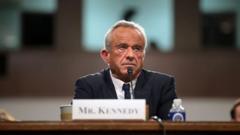In his first confirmation hearing, Kennedy confronts senators over his controversial views on vaccines, abortion rights, and US food policy, drawing both criticism and support.
RFK Jr. Faces Senate Scrutiny in Confirmation Hearing

RFK Jr. Faces Senate Scrutiny in Confirmation Hearing
Robert F. Kennedy Jr. undergoes intense questioning as he seeks approval for health secretary amidst divisive opinions on vaccines and public health.
In a highly anticipated confirmation hearing held on Wednesday, Robert F. Kennedy Jr., President Donald Trump's nominee for the position of US health secretary, faced a range of tough questions from senators regarding his past controversial statements. The role of health secretary is vital, encompassing oversight of medical research, food safety, and essential public welfare programs.
Kennedy's previous remarks on vaccines drew significant attention, particularly from elected officials concerned about the potential ramifications of his skepticism. Throughout the meeting, senators questioned him about his history of opposing vaccination protocols while referencing his former organization, Children's Health Defense, which has long challenged the safety and efficacy of various immunizations. Kennedy defended his position, stating that he does not oppose vaccinations overall but advocates for enhanced safety studies. He also clarified his stance on the childhood vaccination schedule, asserting that he is not a conspiracy theorist but rather someone seeking accountability in health matters.
The uproar during the hearing was occasionally interrupted by protests, yet Kennedy received applause when he emphasized his commitment to improving public health, a key theme that resonated with some attendees. He expressed a strong opposition to the prevalence of processed foods in the American diet, attributing it to the growing obesity epidemic and health issues. He vowed to reevaluate chemical additives in the food industry and reiterated that he does not intend to restrict access to popular fast food items.
Senators also pressed Kennedy on his transformed views on abortion. Once an advocate for reproductive rights, Kennedy stated, "Every abortion is a tragedy," while claiming he would adhere to President Trump's policies. This assertion led to pushback from Democratic senators who accused him of abandoning his principles for political gain.
The issue of healthcare accessibility arose when Senator Bernie Sanders questioned Kennedy about his stance on universal healthcare as a human right. Kennedy's indecision on whether all individuals should receive healthcare sparked criticism from the committee, especially as it highlighted the disparity in drug costs between the US and other nations.
The differing perspectives between Democratic and Republican senators became apparent throughout the questioning; the former mostly challenged Kennedy on his views regarding vaccines and misinformation, while Republicans lauded his focus on reducing chronic disease.
As the hearing concluded, Kennedy found both support and skepticism, culminating in varied responses from senators. Some Republicans rallied behind him, while Democrats questioned his credibility and preparedness. Kennedy will undergo a second confirmation hearing before a different committee, where he will face more inquiries regarding his qualifications for the crucial role.



















